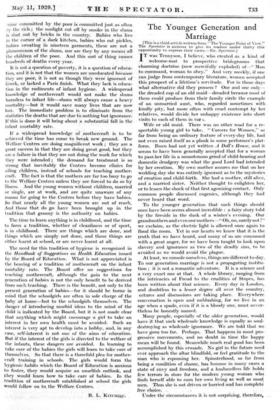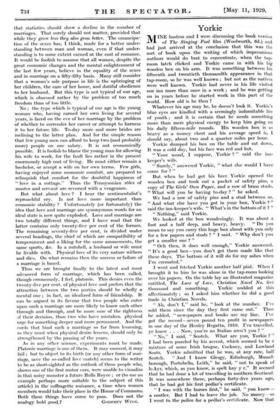The Younger Generation and Marriage [This is a third article
written from " The Younger Point of View." The Spectator is anxious to give its readers under thirty this opportunity to express their views.—En. Spectator.] -E-T was Tennyson, I believe, who created as a kind of welcome-mat to prospective bridegrooms that charming doctrine (now mercifully exploded) of—" Man to command, woman to obey." And very meekly, if one can judge from contemporary literature, women accepted this prospect of a lifetime's servitude. For in those days what alternative did they possess ? One and one only— the dreaded cap of an old maid—dreaded because most of them could produce from their family circle the example of an unmarried aunt, who, regarded sometimes with kindly pity, but more often with cruel contempt by her relatives, would divide her unhappy existence into short visits to each of them in tur i.
Wife or old maid. There was no other road for a re- spectable young girl to take.. " Careers for Women," so far from being an ordinary feature of every-day life, had not even raised itself as a plank in some performer's plat- form. Ibsen had not yet written A Doll's House, and it seems to have been generally accepted that for a woman to pass her life in a monotonous grind of child-bearing and domestic drudgery was what the good Lord had intended by her creation. My own mother assures me that on her wedding day she was entirely ignorant as to the mysteries of creation and child-birth. She had a mother, still alive, and a married sister. Neither thought to enlighten her, or to lessen the shock of that first agonizing contact. Only common people discussed eugenics, although they had never heard that word.
To the younger generation that such things should once have been seems almost incredible : a fairy story told by the fireside in the dusk of a winter's evening. Our grandmothers and even our mothers—" Oh, no, surely not !" we exclaim, as the electric light is allowed once again to flood the room. Yet in our hearts we know that it is the truth that we have heard, and many of us are consumed with a great anger, for we have been taught to look upon slavery and ignorance as two of the deadly sins, to be avoided as we would avoid the plague.
At least, we console ourselves, things are different to-day. To our generation marriage is not a propagating institu- tion ; it is not a romantic adventure. It is a science and a very exact one at that. A whole library, ranging from the intricacies of Freud to the crudities of Stopes, has been written about that science. Every day in London, and doubtless to a lesser degree all over the country, ectures and discussions are taking place. Everywhere conversation is open and unblushing, for we live in an age when a spade, even if it is a bloody one, must never- theless be honestly named.
Many people, especially of the older generation, would have it that such wholesale knowledge is equally as soul- destroying as wholesale ignorance. We are told that we have gone too far. Perhaps. That happens in most pro- gressive movements, and no doubt in time the happy mean will be found. Meanwhile much real good has been accomplished by this crusade. No girl in the future need ever approach the altar blindfold, or feel gratitude to the man who is espousing her. Spinsterhood, so far from being a condition of shame, has become in many cases a state of envy and freedom, and a husbandless life hOlds few terrors in store for the modern young woman who., finds herself able to earn her own living as well as most men. Thus she is not driven or harried and has complete free choice. , Under the circumstances it is not surprising, therefore, that statistics should show a decline in the number of marriages. That surely should not matter, provided that while they grow less they also grow better. The emancipa- tion of the sexes has, I think, made for a better under- standing between man and woman, even if that under- standing is to some extent earned at the cost of romance. It would be foolish to assume that all women, despite the great economic changes and the mental enlightenment of the last few years, believe in the equality of the sexes and in marriage on a fifty-fifty basis. Many still consider that a woman's sole purpose in life is the upbringing of her children, the care of her home, and dutiful obedience to her husband.. But this type is not typical of our age, which is obsessed rather by the problem of too much freedom than of too little.
No ; the type which is typical of our age is the young woman who, having earned her own living for several years, is faced on the eve of her marriage by the problem of whether to surrender her career or attempt to harness it to her future life. To-day more and more brides are inclining to the latter plan. And for the simple reason that few young men can afford to keep two (and probably more) people on one salary. It is not economically possible. It is foolish to blame the young man for allowing his wife to work, for the fault lies rather in the present enormously high cost of living. He must either remain a bachelor, or accept a wife on her own terms. Few girls, having enjoyed some economic comfort, are prepared to relinquish that comfort for the doubtful happiness of " love in a cottage." Thus the Tennysonian roles of master and servant are reversed with a vengeance.
But what about love ? I hear the sentimentalist's reproachful cry. Is not love more important than economic stability ? Unfortunately (or fortunately) the idea that love and marriage are synonymous words for an ideal state is now quite exploded. Love and marriage are two totally different things, and I have read that the latter contains only twenty-five per cent of the former. The remaining seventy-five per cent, is divided under several headings, the chief of which are compatibility of temperament and a liking for the same amusements, the same sports, &c. In a nutshell, a husband or wife must be livable with. Physical love of its very nature withers and dies. On what remains then the success or failure of a marriage is based.
Thus we are brought finally to the latest and most advanced form of marriage, which has been called, though erroneously, I feel, platonic. This denies even the twenty-five per cent. of physical love and prefers that the attraction between the two parties should be wholly a mental one ; in fact, an idealized form of friendship. It can be argued in its favour that two people who enter upon such a marriage are more likely to know each other through and through, and be more sure of the rightness of their decision, than two who have mistaken physical urge for something deeper and more permanent. And the cords that bind such a marriage so far from lessening, as they must when physical desire lessens, should only be strengthened by the passing of the years.
As in any alter science, experiments must be made. Platonic marriage is one of them. It may succeed, it may fail ; but to object to its birth (or any other form of mar- riage, save the so-called love match) seems to the writer to be as short-sighted as the outlook of those people who, shown one of the first motor cars, were unable to visualize in that noisy monster a future Rolls Royce ; or (to use an example perhaps more suitable to the subject of this article) in the suffragette nuisance, a time when women members would take their place in the House of Commons. Both these things have conic to pass. Does not the











































 Previous page
Previous page